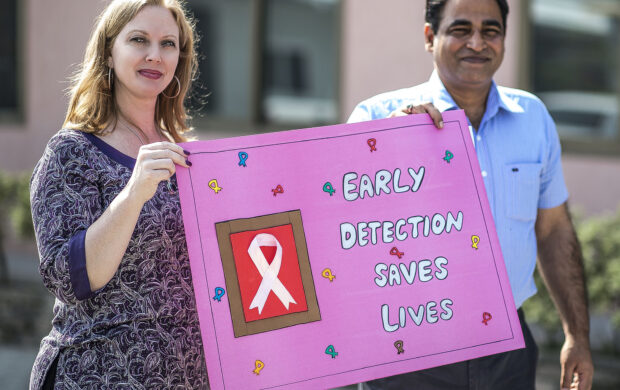Forum for the Future and Johnson & Johnson Foundation
Written by Marion Birnstill, Senior Manager Global Community Impact EMEA at the Johnson & Johnson Foundation; and Ivana Gazibara, Strategic Foresight Advisor and former Director of The Futures Centre
Revisit the #ResilientHealthFuture Dialogues
Since long before the emergence of COVID-19 the healthcare community has been calling for vital changes. Now, in the wake of the pandemic, we have an unprecedented opportunity for transformation, exploring how we might design wellbeing-focused health systems for the future.
This is an opportunity that both the Johnson & Johnson Foundation and leading international sustainability non-profit, Forum for the Future, are determined to seize. While the strategy of the Johnson & Johnson Foundation is to better connect community healthy and primary care – namely by supporting people on the frontlines of care – the pandemic has been a strong reminder of how interconnected health is. With this in mind, the time is right to ask what ingredients are needed for the health system of the emerging future, and what role community health has to play. What will it take to redefine health and the purpose of the health system to be focused on sustaining good health rather than a response to diseases?
What questions do we want to answer?

Grounded in the belief that community health is a vital mechanism for shifting to a resilient healthcare system, we wanted to dig deeper into the ways in which we can enable that shift to happen and identify the levers of transformation. Ultimately, we landed on five questions.
- What is community health and why is it important?
- How do we design health systems that are in pursuit of health and not just disease treatment?
- What does equitable community health look like in the digital age?
- What mechanics and structures are needed to support and elevate community health solutions?
- What future health workforce do we need and how can we train and resource them?
These five questions have led to a number of key takeaways, ranging from the macro to the specific.
We will outline these in more detail in our upcoming sensemaking report but below we share a glimpse into some of the insights that emerged.
- Health systems don’t exist in a bubble: they are affected by everything from the climate to the economy, to housing, to food. Thus, all policy and financing mechanisms for a particular region are going to have a significant impact on the health of the local population.
- People live in communities, not health systems: community health holds significant power in building trust and empowering communities to care for themselves, thus shifting the needle from cure to prevention.
- We need to design health systems with compassion in mind: looking at our current healthcare system, you would think that its purpose is to generate revenue, rather than to keep people well. If you were to restructure the system around the latter, you would end up with something driven by value, rather than by volume.
- We need to capture community health workers’ insights more effectively: as the central (and sometimes only) point of contact between the patient and the health system, community health workers have a wealth of knowledge at their fingertips. We must bring their voices and insights to the decision-making table, as well as capturing and utilizing the data they control.
As the conversations draw to a close, the Johnson & Johnson Foundation and the Forum for the Future are focused on continuing to work together to bring our findings to the wider healthcare community and beyond. As well as the sensemaking report, we will be hosting a formal launch conversation on 28th September, during the UNGA, inviting others to reflect and co-create with us around these vital themes. If this resonates with you, please join us.
How can other foundations partner for change?
While deep collaboration is vital to building back better in the wake of the COVID-19 pandemic, partnerships of this kind come with their own challenges. Every organization has to try and balance the demands of their internal and external stakeholders with genuine impact. To build truly impactful partnerships, you must be willing to embrace this tension, avoid focusing purely on organizational mandates and work instead towards a collective vision – putting the collective challenge at the center.
In the words of Dr Otto Scharmer, Senior Lecturer in the MIT Sloan School of Management and co-founder of the Presencing Institute: “We have a choice whether to perpetuate the old rules of our collective behavior — or to change them.” We hope that other Foundations, actors, and organizations will choose the latter and join us on this journey.
















Join discussion